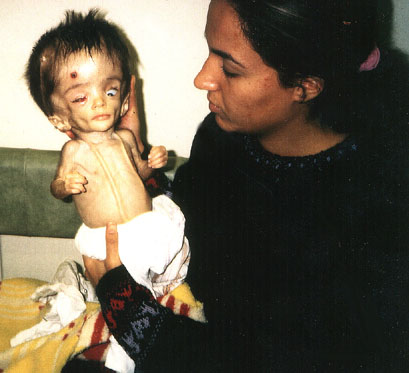[This newsletter contains graphic images of severe birth deformities directly attributable to the use of radioactive depleted uranium weaponry by U.S. forces during the sustained bombing of Iraq. These images will very likely shock, repulse and enrage you. I will not be posting an alternative, graphics-free version of this newsletter. As disturbing as these images are, they need to be brought to the attention of the American public. If we, as a people, are going to sit back and do nothing as further war crimes are plotted and committed against the Iraqi people, then we had better be able to look at the results of those actions.]
“Unborn children of the region [are] being asked to pay the highest price, the integrity of their DNA.”
– Ross B. Mirkarimi “The Environmental and Human Health Impacts of the Gulf Region with Special Reference to Iraq,” The Arms Control Research Centre, May 1992
Iraq, Iraq, Iraq. That’s all everyone seems to be talking about these days.
And, yes, I do remember that I said last week that in this week’s newsletter I was going to wrap up the discussion of what the ‘War on Terrorism’ is really about, but I got sidetracked with all this talk of an impending attack on Iraq, so I’ll have to wait until next week to get back to that.
So we’re going to attack Iraq in August. Or maybe it’s going to be in September. Or October. Or maybe nearer the end of the year. Or we might wait until early next year. Or maybe until next summer. But we’re definitely going in sometime soon.
And we’re going to roll straight into Baghdad with a massive tank blitz. Or we’re going to begin with a sustained ‘air war,’ as is our usual custom. Or we’re going to launch a massive offensive on multiple fronts, from both the air and the ground. And it’s going to require some 250,000 U.S. troops. Or maybe just some elite teams of ‘Special Forces’ operatives. But we’re definitely going to do something.
Because, you know, we just have to do something. No one even questions that we have to do something. That much is apparently so self-evident that only a fool would question why we have to do anything at all..
I mean, we can’t just allow a tyrant like Saddam Hussein to continue getting away with the things that he does, can we? This guy is just like Hitler, only with a different style of mustache. That other George Bush guy said so twelve years ago. And didn’t we learn anything from the so-called ‘appeasement’ of the first Hitler?
Of course we did! We learned to never again appease an aspiring dictator. Thugs like Saddam and Adolf have to be nipped in the bud, before they can unleash their evil designs upon the world. I guess that’s why after bombing much of his country into oblivion, we left Saddam standing.
And over a decade later, he is still standing. So I guess you could say that we have already ‘appeased’ him for much longer than the real Hitler was supposedly appeased. But enough is enough. Now it’s time to rid the world of this guy once and for all, and by any means necessary.
The only problem is that we’re having a tough time finding a marketable excuse for going in and wreaking further havoc in Iraq. We can’t seem to get that “let’s link Saddam to the September 11 attacks” thing to fly. And attempts to whip up popular support through fear, by claiming that Iraqi weapons of mass destruction are aimed directly at our homes and neighborhoods, haven’t been nearly as effective as one would hope.
Iraq has, after all, been in an undeclared state of war with the United States for well over a decade now. You see, when you routinely dump bombs on another country, illegally restrict that country’s airspace, and sanction the children of that country into early graves … well, those are the kinds of things that might be considered acts of war.
When you continue implementing those policies for a period of eleven years, then those are the kinds of things that might be considered acts of genocide.
But the point here is that, despite enduring over a decade’s worth of unprovoked and blatantly illegal acts of war committed by the United States, Iraq has not once used even conventional weapons against any Americans (other than those flying U.S. bombers on daily ‘sorties’ through Iraqi airspace), let alone any so-called weapons of mass destruction.
Truth be told, Iraq has, relatively speaking, been on its best behavior for the last decade or so. Oh sure, the Iraqis gave the boot to U.S.-led weapons inspection teams, after accusing said teams of largely being fronts for U.S. intelligence operations — which in fact was later acknowledged to be the case.
But other than that, the Iraqis haven’t really done much to rile too many people up. They haven’t, for instance, dumped U.S.-supplied chemical warfare agents on any indigenous dissident groups. They also haven’t waged any long, seemingly pointless and incredibly bloody wars with their neighbors, while the U.S. sat on the sidelines cheering and arming both sides.
So I guess to justify launching a completely unprovoked attack on Iraq at this point in the game, we’re going to have to go back to the beginning — to when Americans first heard mention of the nation of Iraq. That was, of course, in August of 1990, when Saddam decided to annex Kuwait. Before that, we didn’t much know or care about what was going on in Iraq, and we certainly didn’t yet know that the country was being led by Hitler incarnate.
But that all changed when those bloodthirsty Iraqi butchers got a wild hair up their ass and decided to conquer much of the Middle East, starting with the invasion of Kuwait. Poor little Kuwait, a more-or-less sovereign nation, was just sitting there minding its own business when that monster, Saddam, sent in his goon squads to toss premature babies out of their incubators.
Oh … wait a minute … I just remembered that the whole incubator thing was a fabricated story that was told by a member of the Kuwaiti royal family who claimed to have been an eyewitness, and who of course didn’t let on that her pop was the ambassador to the U.S. So never mind that. The point is that the Iraqis behaved like barbarians, and I’m sure that there were plenty of real-life examples of that barbarity that could have been referenced without resorting to that fanciful story about the non-existent incubators.
And having conquered Kuwait, the Iraqi barbarians then began massing on the border of Saudi Arabia, preparing to take that country by force as well. And there was no way that we could allow that to happen. We weren’t about to sit by while Saudi babies were tossed out of their life-sustaining incubators.
Certainly any nation that would treat the most innocent, defenseless members of society in such a brutal manner is far too barbaric to coexist with the ‘civilized’ nations of the world. To inflict such cruelty on a newborn baby, or to sit back and allow such barbarity to occur, is unthinkable … unless, of course, we’re talking about Iraqi babies.
That would be a different story altogether. Iraqi babies, you see, can be killed by the hundreds of thousands without it being any big deal. Secretary of State Madeleine Albright, speaking on behalf of the Clinton administration, confirmed that fact on national television in May of 1996, when Leslie Stahl asked her:
We have heard that half a million children have died. That is more than died in Hiroshima. And, you know, is the price worth it?
Albright’s response was:
I think this is a very hard choice. But the price — we think the price is worth it.
Albright wasn’t too specific about exactly what it was that was worth the lives of half a million children, mostly children under the age of five. But whatever it was is still being paid for with children’s lives. Six years have passed since Albright’s 60 Minutesappearance, and hundreds of thousands of additional Iraqi children have given their lives for the cause.
It’s a pretty safe bet that those in Washington still think the price is worth it. They also likely think that the radioactive contamination of the country through the widespread use of depleted uranium weaponry was a price worth paying. Those who have given birth to a DU baby though, like this one here, might have a somewhat different opinion.

But on the receiving end of the bombs, war doesn’t seem like a feel-good sporting event, and it doesn’t look like a sanitized video game. It doesn’t come with theme music and cool “Operation Desert Storm” graphics. On the receiving end, it feels like sheer terror, and it looks an awful lot like death, dismemberment and wanton destruction. And it doesn’t end when the bombs stop falling.
The deliberate targeting of the country’s civilian infrastructure, and the resultant degradation of water and food supplies, and healthcare and sanitation services, continues to kill many years down the road. So too do the thousands of unexploded cluster bomblets left littered across the landscape.
To be a parent in Iraq today is to live with the very real and palpable fear that the next child’s funeral that you attend may be for one of your own. And then, of course, there are, in case I haven’t mentioned them yet, the DU babies — one of the most horrifying legacies of the Gulf War.

Will these images come back to haunt you in your dreams? Maybe … but not nearly to the extent that images such as these haunt the dreams of mothers and fathers of DU babies all across Iraq. And not nearly to the extent that they haunt the dreams of millions of prospective Iraqi mothers and fathers, who wonder if they will be bringing a child into this world, or another exhibit for the Iraqi horror show.
Some of us can perhaps rationalize this horror show by assuring ourselves that the Iraqis brought it on themselves. They should have never invaded Kuwait and rattled their sabers at their other neighbors.
Of course, our ambassador did give them a green light to launch the invasion, as even Dan Rather candidly admitted on the air last week. He even said that Hussein would never have taken such actions without the tacit approval of Uncle Sam. It’s funny, but I don’t remember Dan telling us that twelve years ago when he and his media cohorts were busy whipping up support for the first U.S. assault on Iraq.
Another funny thing is that as soon as Saddam took our bait, we acted like we had no idea where he got the addled notion that he could just march into Kuwait and claim it as his own. Our dialog with Iraq at the time went something like this:
“Oh … your border dispute with Kuwait? … well, you know, we don’t really have any interest in that … and we will, you know, just sort of look the other way if you want to just take matters into your own hands on that one … so feel free to just, you know … hey! wait a minute! what the hell do you think you’re doing? what are you, some kind of Hitler or something?”
And then we really showed him. We taught him a lesson that he’s not likely to forget. Just to make sure he doesn’t forget, we left behind some reminders of what happens when you fall out of favor with Uncle Sam. They look something like this.

He claimed that Iraq wasn’t really occupying Kuwait so much as it was taking back what was rightfully, and historically, already theirs.
He also claimed that Kuwait had provoked the attack. There were long-standing border disputes, disputes over the repayment of loans, and – perhaps most significantly – claims that Kuwait was illegally ‘slant drilling’ into Iraqi oil fields. And, in fact, that is precisely what the Kuwaitis were doing, while thumbing their noses at Iraqi threats of retaliation.
Kuwait, you see, had an ace-in-the-hole – the backing of the U.S. military – so they really didn’t pay much attention to Saddam’s saber rattling. They continued to slant drill even after being repeatedly warned to cease and desist.
For those who don’t know what slant drilling is, it is exactly what it sounds like it is: working from atop Kuwaiti soil (more or less — the borders have never been clearly defined), deep wells were being drilled at a sharp angle so as to tap into oil deposits that were clearly under Iraqi soil.
That is, strangely enough, something that can cause tension between neighbors.
You can verify this yourself by conducting a simple experiment, which I will describe after pausing briefly to remind readers once again of the price we are willing to pay to achieve whatever objectives we are pursuing in Iraq.

Now what you want to do is sit by and wait for “Iraq” to turn to talk to his friend. When he does, you whip out your straw, lean over and angle it into his drink, and then quickly suck it dry before he turns back around. If he says anything about it, just play dumb at first, but continue doing it every time he orders a new drink.
If he confronts you about it, tell him that you have a big, mean friend waiting out in the car who will kick his ass if he tries anything. That may or may not buy you some time. Continue this process until you determine what the final outcome will be. I’m betting that it will be that you, who we will call, let’s say, “Kuwait,” will fairly quickly be beaten senseless by “Iraq.”
The point here, in case you missed it somehow, is that the Kuwaitis were knowingly and arrogantly behaving in a way that they knew was inviting a military response from Iraq. So maybe they weren’t so innocent after all. Certainly not as innocent as, say, this newborn, who has been robbed of a chance at anything approaching a normal life.

It’s not really that hard to track one down. There are rumored to be some still in existence, for those who are willing to devote the time to find one. But I’m going to save you the trouble and let you use one of mine.

One of the first things that you will notice is that the chunk of real estate identified as “Kuwait” looks very much like it was carved out of Iraqi territory. The border just seems a bit – shall we say – unnatural.
And it’s not just a random chunk of Iraq. No, it’s a very important chunk. It is the chunk that would provide Iraq with some valuable beachfront property. Without it, the country is nearly landlocked. That’s because, as can also be seen on the map, Iraq’s border with Iran (to the east) looks a little odd as well.
Most of that border follows a fairly clearly defined mountain route. But then towards the southern end it just sort of veers off for no particular reason. The net result is that the southern portion of Iraq looks like a little kid trying to squeeze in to use the urinal between two 400-pound, steroid-enhanced football players.
Being nearly landlocked, of course, makes it much more difficult to get oil, the life-blood of the Middle East, to market. I’m going to take a shot in the dark here and guess that this could be one of the main reasons for Iraq’s long-standing border disputes with its neighbors.
I’m not suggesting here that Iraq’s bloody conquests of Kuwait and Iran – complete, in the latter case, with the wholesale use of poison gas – were therefore justified. This is not meant to be an apologia for Iraq.
The point here is that the war with Iran, and the annexation of Kuwait, had nothing to do with any grand designs for regional or global conquest, despite the labeling of Hussein as the new Hitler. It had to do with acquiring coastal access.
Saddam Hussein is no doubt a brutal ruler. But has he really done anything to merit twelve years of suffering by the Iraqi people? Has he really done anything to earn his country’s star billing as one of the “Axis of Evil” nations? Is he really that much worse than his neighbors, or, for that matter, than his former mentor — Uncle Sam?
Iraq has brutally repressed its Kurdish population, to be sure, but not to the extent that its northern neighbor, Turkey, has repressed and slaughtered its Kurdish citizens. And yet Turkey doesn’t have a better friend in the world than the United States. That doesn’t seem quite right.
And was the military occupation of Kuwait really any worse than – dare I say it? – the Israeli military occupation of the West Bank? And isn’t Israel also one of our best friends in the “War on Terrorism”?
Iraq saw something that served a strategic purpose and just took it. Most people would say that is wrong. But what of Hawaii, or Puerto Rico, or Guam, or the Philippines, or Cuba, or the Panama Canal, or … ? What about, for that matter, the vast majority of the continental United States, which was taken by force from the Native American nations and from Mexico?
Gassing problematic indigenous groups is certainly appalling behavior. But is it any worse than deliberately infecting indigenous peoples with smallpox? Is it worse than systematically slaughtering their primary source of food and clothing? Is it worse than swinging their babies and small children by their ankles, pulverizing their heads against trees and rocks, so as to save valuable ammunition?
Ahh … but that’s ancient history, you say. Not all that ancient, actually, but let’s take a more recent example. Is it worse than dumping another kind of poison, crack cocaine, into the neighborhoods of a potentially ‘problematic’ ethnic group? And is it worse than allowing syphilis to secretly fester for decades in select members of that same ethnic group, so that the progress of the disease and its patterns of transmission could be tracked?
I could go on, but let’s get back to Kuwait. Besides taking up the lion’s share of beachfront property, Kuwait also happens to be sitting atop a good portion of one of the richest oil fields in the region — though that didn’t stop the Kuwaitis from helping themselves to their northern neighbor’s oil reserves as well.
And exactly who are the Kuwaitis? A lot of them are members of the Al Sabah family, which has wielded power in the Middle East for some 250 years. And a lot more of them are members of a small handful of other families that are intermarried with the Al Sabah family.
And a lot of them aren’t really Kuwaitis at all, but are actually foreign “guest workers” who even the U.S. State Department has acknowledged work under conditions that bear a striking resemblance to indentured servitude.
In Kuwait, the ‘government’ – which is to say, the Al Sabah family – owns and controls virtually everything. According to State Department figures, 92% of the ‘indigenous’ work force works for the government. In contrast, foreign workers, who have virtually no rights in the country and are subject to severe discrimination, make up an astounding 98% of the ‘private sector’ work force.
Kuwait is not really so much a country as it is the private estate of the Al Sabah family and its Western protectors. Think of it as the world’s largest private country club, tended to by a small army of imported slave laborers who perform virtually all of the real work at the club while the ‘members’ sit back and count their money.
Meanwhile, in neighboring Iraq, expectant mothers sit back and count the days until they will come face to face with the newest addition to their families, forever trying to put aside the fear that that new addition will look like this.

Between 1976 and 1992, there were only five years when the country wasn’t under martial law, and therefore under autocratic rule by the Amir and his extended family. In fact, the country was under martial law when the U.S. rushed to its defense, in the name of promoting ‘freedom’ and ‘democracy,’ of course.
A look at a recent roster of Kuwaiti government officials reveals what appears to the discerning eye to be a pattern:
| Amir | Sabah, Jabir, al-Ahmad al-Jabir Al |
| Prime Minister | Sabah, Saad, al-Abdallah al-Salim Al |
| First Deputy Prime Minister | Sabah, Sabah, al-Ahmad al-Jabir Al |
| Deputy Prime Minister | Sabah, Salim, al-Sabah al-Salim Al |
| Minister of Defense | Sabah, Salim, al-Sabah al-Salim Al |
| Minister of Finance & Commerce | Sabah, Ahmad, Abdallah al-Ahmad Al |
| Minister of Foreign Affairs | Sabah, Sabah, al-Ahmad al-Jabir Al |
| Minister of Oil | Sabah, Saud, Nasir al-Saud Al |
| Minister of State | Sabah, Nasir, Muhammad Ahmad Al |
| Governor, Central Bank | Sabah, Salim, Abd al-Aziz Al |
| Ambassador to the U.S. | Sabah, Muhammad, al-Sabah al-Salim Al |
I think that is what U.S. officials refer to as a “broad-based, coalition government.” Or something like that.
The Al Sabah estate … oops, I meant to say the nation of Kuwait … claims to have an independent judiciary to provide some sort of system of checks and balances on the all-powerful executive branch, but all judges in the country are appointed by, and are therefore answerable to, the Amir. It’s a pretty safe bet that more than a few of them are named Al Sabah.
The State Department’s Bureau of Democracy, Human Rights, and Labor (democracy, human rights and labor being three things that, of course, the U.S. State Department is deeply concerned about, so it makes perfect sense that they would have a bureau so named) supplies some other interesting facts about the nation of Kuwait: all political parties are banned; freedom of assembly and association are restricted; women are denied the right to vote and are subject to rampant discrimination and acts of violence; informal censorship is practiced; limits are placed on freedom of religion and movement; worker’s rights are restricted; men are required to get government approval to marry a ‘foreigner’; and at least two internal secret police forces, the CID and the KSS, enforce the dictates of the Amir with a notoriously heavy hand.
(http://www.multied.com/NationbyNation/Kuwait/Human.html)
Nice country. And that, needless to say, is a portrait of the Kuwaiti socio-political system painted by one of the nation’s staunchest allies and protectors.
Based on the U.S. State Department’s description of Kuwait, you might be tempted to conclude that it sounds an awful lot like a fascist dictatorship. You might, in fact, reach the same conclusion about all the Western-supported emirates on the Arabian peninsula.
Strangely though, you never hear the Amir of Kuwait described as a new Hitler.
Prior to the U.S.-led devastation of the country, Iraq was considered to be far more advanced politically and socially than its neighbors. It had far-and-away the region’s most advanced civilian infrastructure — most of which now lies in ruins. In a country that previously had a relatively modern healthcare system, easily preventable diseases now run rampant, with children, always the children, being the most frequent victims.
And then there are, lest we forget, the DU babies.

It is abundantly clear that Iraq could have invaded Saudi Arabia whenever it chose to do so, if in fact Saddam had any intention of pursuing such a course of action. There was never any indication that he did. But – what the hell? – it made a good story at the time.
There is certainly no indication that Saddam has any current interest in attacking any of his neighbors. There is no indication that Iraq will be doing much of anything for the next couple decades other then rebuilding its shattered infrastructure and burying its dead. But that isn’t going to stop the U.S. from inflicting yet more suffering on the Iraqi people.
How many more children will die? How many will be blown apart by the bombs and missiles? How many more will become victims of cluster bomblets? How many more will die from disease, malnutrition and dehydration, due to lack of medical supplies, food and water?
How many? Tens of thousands? Hundreds of thousands? Millions?
Reports surfaced last week claiming that Saddam’s defensive strategy would be to keep his forces out of the desert and in the cities. The goals were said to be: to ensure heavy civilian casualties, thereby provoking international opposition to the war; and to draw U.S. forces into the cities, where they would also suffer heavy casualties, which would then erode support among the American people.
Is the American public being conditioned to accept no-holds-barred attacks on Iraqi cities, with massive civilian casualties? It does seem that way. Or worse yet, are we being conditioned to accept strikes on Iraqi cities with ‘weapons of mass destruction,’ under the pretext of avoiding heavy U.S. casualties?
How many American lives was it that we claimed to have saved by dropping atomic bombs on Hiroshima and Nagasaki?
How many Iraqis will die this time around? Will anyone bother to count? Does anyone care?
And how many more DU babies will there be? How long will Iraqi men and women have to fear bringing a new life into this world? How long will it be before they no longer have to hope and pray for a normal child? How large will the cast of the Iraqi Horror Show grow?
But don’t worry. You won’t ever have to deal directly with the DU babies. In time, these images will fade from memory. And you won’t likely ever come face-to-face with a DU baby. Unless, that is, you happen to be a veteran of the ground war during the first attack on Iraq, or you happen to be married to such a vet.
If so, then your baby could come out looking like this child fathered by just such a veteran. There are, you see, some American entries in the horror show as well.

